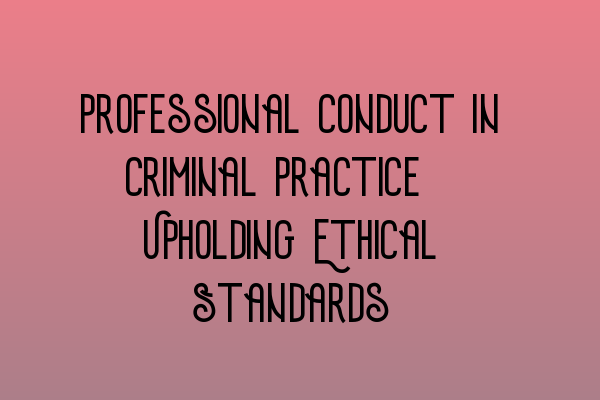Professional Conduct in Criminal Practice: Upholding Ethical Standards
When it comes to criminal practice, upholding ethical standards is of utmost importance. As legal professionals, we have a duty to ensure our conduct is in line with the highest ethical principles. In this article, we will explore the key aspects of professional conduct in criminal practice and why it is crucial for the integrity of the legal profession.
The Role of Professional Conduct
Professional conduct in criminal practice encompasses various elements, including honesty, integrity, and confidentiality. These principles guide our interactions with clients, colleagues, and the court. By adhering to these standards, we not only maintain the integrity of the legal profession but also ensure a fair and just system for all parties involved.
Honesty and Integrity
Honesty and integrity are the foundation of professional conduct. As criminal practitioners, we must be truthful in our communications with clients, colleagues, and the court. This means providing accurate advice, presenting evidence objectively, and avoiding any misleading or deceptive conduct.
In our client interactions, it is essential to maintain transparency and honesty. We should clearly communicate the strengths and weaknesses of their case, the potential outcomes, and any limitations or risks. This helps to establish trust and ensures clients can make informed decisions about their legal representation.
When dealing with colleagues, whether they are opposing counsel or members of our own firm, it is crucial to maintain a professional and respectful demeanor. Personal attacks or dishonesty undermine the integrity of the legal profession and can have serious consequences.
Confidentiality
Confidentiality is another vital aspect of professional conduct. As criminal practitioners, we often deal with sensitive information that must be protected. Client confidentiality is paramount, and we must not disclose any confidential information without proper authorization.
By maintaining strict confidentiality, we ensure that clients feel comfortable sharing all relevant information, leading to a more effective representation. Breaching confidentiality not only damages the attorney-client relationship but can also have legal and professional ramifications.
Why Professional Conduct Matters
Professional conduct is essential for several reasons:
- Protecting the rights and interests of clients
- Maintaining the integrity of the legal profession
- Promoting fair and just legal proceedings
- Building trust and confidence in the justice system
By upholding ethical standards, we ensure that clients receive competent and ethical representation, and their rights are protected. This builds trust in the legal profession and the justice system as a whole.
Furthermore, professional conduct is closely tied to the reputation of individual practitioners and law firms. A strong reputation for ethical behavior can attract clients and establish credibility within the legal community.
Conclusion
Upholding ethical standards is crucial in criminal practice. By maintaining honesty, integrity, and confidentiality, we not only protect the interests of our clients but also maintain the integrity of the legal profession. Professional conduct promotes fair and just legal proceedings, builds trust in the justice system, and establishes strong reputations for individual practitioners and law firms.
If you are interested in furthering your legal knowledge and preparing for the SQE exams, consider exploring our related articles and courses:
- SQE 1 Practice Exam Questions
- SQE 1 Practice Mocks FLK1 FLK2
- SQE 2 Preparation Courses
- SQE 1 Preparation Courses
- SRA SQE Exam Dates
